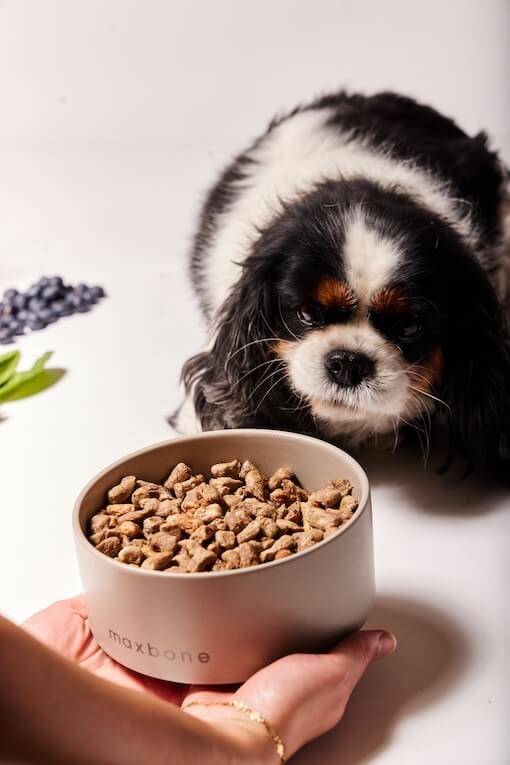The Truth About MSG and Dog Food
DogFoodAdvisor is reader supported See how
Dog Food Advisor is 100% impartial and is never paid to promote any brand. But if you buy using links on this page, we may earn a referral fee.
There’s much myth and hearsay when it comes to the topic of MSG in dog food. As is often the case, the reality is complex.
What is MSG?
First of all, it’ll help to fully understand what MSG is. Monosodium Glutamate is a type of salt sometimes added to food, usually to enhance savory flavors. There are foods naturally high in glutamates, such as tomatoes and aged cheeses, but it’s also artificially synthesized for use in cooking.
Many humans appreciate the umami characteristics that MSG adds to meals and it’s the same for dogs too, which is why it’s sometimes added to dog food.
Is MSG safe for dogs?
The US Food and Drug Administration (FDA) considers MSG to be ‘generally recognized as safe’ and it’s a staple ingredient in many Asian cuisines. In small quantities, the vast majority of people will suffer no adverse effects from consuming MSG.
However, just because your dog can eat MSG, does that mean they should?
It must be acknowledged that the scientific research exploring the effects of MSG on dogs is limited, especially when it comes to a longer timeframe.
What few studies there are tend to look at the effect on mammals of consuming much larger quantities of MSG than would otherwise be digested from sensible portions of dog food — these linked symptoms include neurotoxicity and organ damage.
There are also some claims that MSG can contribute towards obesity due to the way in which it interferes with how the body processes leptin, a hormone that signals you’ve had enough to eat. Again, studies linked to this theory are inconclusive and geared towards humans.
However, many dogs are greedy enough already, so you could be justified in thinking they don’t need any further encouragement whatsoever to overeat.
Can dogs overdose on MSG?
One thing to remember is MSG is a salt, so dogs can die from overconsumption. However, your dog would have to eat the equivalent of several tablespoons, rather than the milligrams added to food, for this to happen.
Still, if you have the ingredient at home, make sure it’s securely stored and kept well away from dogs.
Of course, dogs shouldn’t consume too much sodium, or salt, in their diet generally. Most dog foods contain enough salt without the need for additional seasoning, so you shouldn’t give them salty human foods as a treat.
This is especially true for dogs with hypertension, kidney disease or heart problems, or who have been recommended to follow a low-sodium diet by a vet.
Why is MSG added to dog food?
OK, so a little bit of MSG won’t harm your dog, but perhaps consider why the additive is being added in the first place. Is the flavor enhancer being used as a means of disguising poor-quality or nutritionally-deficient ingredients?
It’s certainly a possibility, which is why it makes sense to take a close look at a dog food’s ingredients before you buy — you’ll find thousands of recipes rated on The Dog Food Advisor using and listing the information on the label. You could even get a vet’s advice on whether it’s worthy of your dog’s bowl.
That way, you can be certain your dog is getting the vital nutrients it needs for good health — and not being fooled by fillers or enhancers.
How to avoid dog food with MSG?
If you want to eliminate MSG from your dog’s diet, be aware that it’s sometimes not labelled clearly.
If you see the terms hydrolyzed or autolyzed in the ingredient list — often suffixed with protein or yeast — you could be looking at MSG in a cunning disguise. The same can be said for vague terms like natural flavorings or soy extracts.
You should also be wary of ingredients that sometimes use MSG or a variant in the production process, such as corn starch, malt extract or powdered milk. Anything described as ultra-pasteurized, enzyme-modified or protein-fortified might be culpable, too.
However, there are ways you can go about completely bypassing MSG. Organic recipes won’t contain any artificial ingredients and the same can be said for fresh, raw and natural dog foods too.
These can be more expensive, but the health benefits might outweigh that cost.
Can MSG stop dogs from eating their own feces?
One of the more curious theories linked to MSG is that it can stop dogs from engaging in the unpleasant habit of eating their own poo (or Coprophagia if you want to use the scientific term).
Rather ironically given its use as a flavor enhancer, MSG is said to change the taste of a dog’s stool so it becomes unpalatable.
Does this work? Some swear by it and you’ll find MSG in the ingredient list of some commercially available poop-eating deterrents. However, nothing’s proven and there are other ways you can tackle the habit — try cleaning up as soon as they’ve gone to the toilet and using treats as positive reinforcement instead.
Final word
The Dog Food Advisor does not accept money, gifts, samples or other incentives in exchange for special consideration in preparing our reviews.
However, we do receive a referral fee from online retailers (like Chewy or Amazon) and from sellers of perishable pet food when readers click over to their websites from ours. This helps cover the cost of operation of our free blog. Thanks for your support.
For more information, please visit our Disclaimer and Disclosure page.




